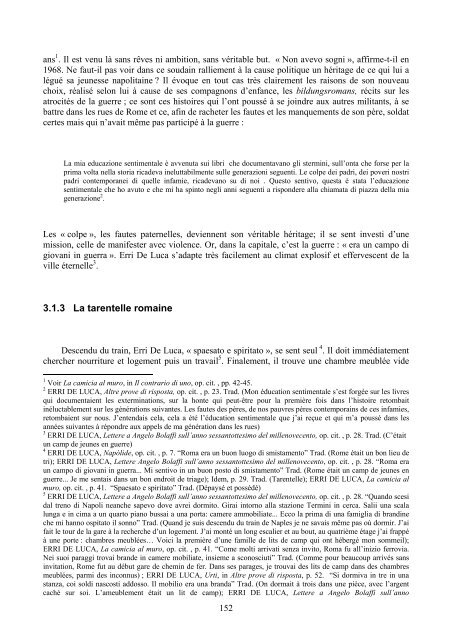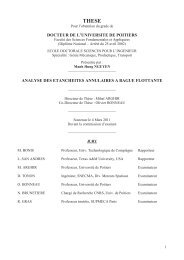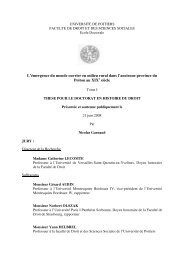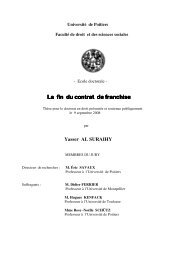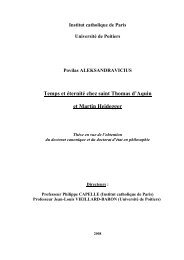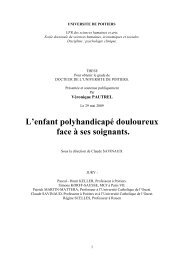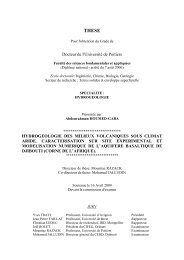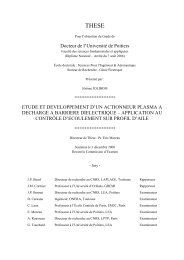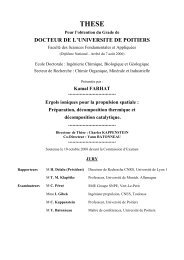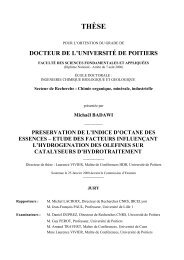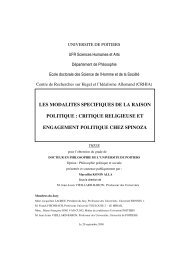Consulter le texte intégral de la thèse - Université de Poitiers
Consulter le texte intégral de la thèse - Université de Poitiers
Consulter le texte intégral de la thèse - Université de Poitiers
You also want an ePaper? Increase the reach of your titles
YUMPU automatically turns print PDFs into web optimized ePapers that Google loves.
ans 1 . Il est venu là sans rêves ni ambition, sans véritab<strong>le</strong> but. « Non avevo sogni », affirme-t-il en<br />
1968. Ne faut-il pas voir dans ce soudain ralliement à <strong>la</strong> cause politique un héritage <strong>de</strong> ce qui lui a<br />
légué sa jeunesse napolitaine ? Il évoque en tout cas très c<strong>la</strong>irement <strong>le</strong>s raisons <strong>de</strong> son nouveau<br />
choix, réalisé selon lui à cause <strong>de</strong> ses compagnons d’enfance, <strong>le</strong>s bildungsromans, récits sur <strong>le</strong>s<br />
atrocités <strong>de</strong> <strong>la</strong> guerre ; ce sont ces histoires qui l’ont poussé à se joindre aux autres militants, à se<br />
battre dans <strong>le</strong>s rues <strong>de</strong> Rome et ce, afin <strong>de</strong> racheter <strong>le</strong>s fautes et <strong>le</strong>s manquements <strong>de</strong> son père, soldat<br />
certes mais qui n’avait même pas participé à <strong>la</strong> guerre :<br />
La mia educazione sentimenta<strong>le</strong> è avvenuta sui libri che documentavano gli stermini, sull’onta che forse per <strong>la</strong><br />
prima volta nel<strong>la</strong> storia rica<strong>de</strong>va ineluttabilmente sul<strong>le</strong> generazioni seguenti. Le colpe <strong>de</strong>i padri, <strong>de</strong>i poveri nostri<br />
padri contemporanei di quel<strong>le</strong> infamie, rica<strong>de</strong>vano su di noi . Questo sentivo, questa è stata l’educazione<br />
sentimenta<strong>le</strong> che ho avuto e che mi ha spinto negli anni seguenti a rispon<strong>de</strong>re al<strong>la</strong> chiamata di piazza <strong>de</strong>l<strong>la</strong> mia<br />
generazione 2 .<br />
Les « colpe », <strong>le</strong>s fautes paternel<strong>le</strong>s, <strong>de</strong>viennent son véritab<strong>le</strong> héritage; il se sent investi d’une<br />
mission, cel<strong>le</strong> <strong>de</strong> manifester avec vio<strong>le</strong>nce. Or, dans <strong>la</strong> capita<strong>le</strong>, c’est <strong>la</strong> guerre : « era un campo di<br />
giovani in guerra ». Erri De Luca s’adapte très faci<strong>le</strong>ment au climat explosif et effervescent <strong>de</strong> <strong>la</strong><br />
vil<strong>le</strong> éternel<strong>le</strong> 3 .<br />
3.1.3 La tarentel<strong>le</strong> romaine<br />
Descendu du train, Erri De Luca, « spaesato e spiritato », se sent seul 4 . Il doit immédiatement<br />
chercher nourriture et logement puis un travail 5 . Fina<strong>le</strong>ment, il trouve une chambre meublée vi<strong>de</strong><br />
1<br />
Voir La camicia al muro, in Il contrario di uno, op. cit. , pp. 42-45.<br />
2<br />
ERRI DE LUCA, Altre prove di risposta, op. cit. , p. 23. Trad. (Mon éducation sentimenta<strong>le</strong> s’est forgée sur <strong>le</strong>s livres<br />
qui documentaient <strong>le</strong>s exterminations, sur <strong>la</strong> honte qui peut-être pour <strong>la</strong> première fois dans l’histoire retombait<br />
inéluctab<strong>le</strong>ment sur <strong>le</strong>s générations suivantes. Les fautes <strong>de</strong>s pères, <strong>de</strong> nos pauvres pères contemporains <strong>de</strong> ces infamies,<br />
retombaient sur nous. J’entendais ce<strong>la</strong>, ce<strong>la</strong> a été l’éducation sentimenta<strong>le</strong> que j’ai reçue et qui m’a poussé dans <strong>le</strong>s<br />
années suivantes à répondre aux appels <strong>de</strong> ma génération dans <strong>le</strong>s rues)<br />
3<br />
ERRI DE LUCA, Lettere a Angelo Bo<strong>la</strong>ffi sull’anno sessantottesimo <strong>de</strong>l mil<strong>le</strong>novecento, op. cit. , p. 28. Trad. (C’était<br />
un camp <strong>de</strong> jeunes en guerre)<br />
4<br />
ERRI DE LUCA, Napòli<strong>de</strong>, op. cit. , p. 7. “Roma era un buon luogo di smistamento” Trad. (Rome était un bon lieu <strong>de</strong><br />
tri); ERRI DE LUCA, Lettere Angelo Bo<strong>la</strong>ffi sull’anno sessantottesimo <strong>de</strong>l mil<strong>le</strong>novecento, op. cit. , p. 28. “Roma era<br />
un campo di giovani in guerra... Mi sentivo in un buon posto di smistamento” Trad. (Rome était un camp <strong>de</strong> jeunes en<br />
guerre... Je me sentais dans un bon endroit <strong>de</strong> triage); I<strong>de</strong>m, p. 29. Trad. (Tarentel<strong>le</strong>); ERRI DE LUCA, La camicia al<br />
muro, op. cit. , p. 41. “Spaesato e spiritato” Trad. (Dépaysé et possédé)<br />
5<br />
ERRI DE LUCA, Lettere a Angelo Bo<strong>la</strong>ffi sull’anno sessantottesimo <strong>de</strong>l mil<strong>le</strong>novecento, op. cit. , p. 28. “Quando scesi<br />
dal treno di Napoli neanche sapevo dove avrei dormito. Girai intorno al<strong>la</strong> stazione Termini in cerca. Salii una sca<strong>la</strong><br />
lunga e in cima a un quarto piano bussai a una porta: camere ammobiliate... Ecco <strong>la</strong> prima di una famiglia di brandine<br />
che mi hanno ospitato il sonno” Trad. (Quand je suis <strong>de</strong>scendu du train <strong>de</strong> Nap<strong>le</strong>s je ne savais même pas où dormir. J’ai<br />
fait <strong>le</strong> tour <strong>de</strong> <strong>la</strong> gare à <strong>la</strong> recherche d’un logement. J’ai monté un long escalier et au bout, au quatrième étage j’ai frappé<br />
à une porte : chambres meublées… Voici <strong>la</strong> première d’une famil<strong>le</strong> <strong>de</strong> lits <strong>de</strong> camp qui ont hébergé mon sommeil);<br />
ERRI DE LUCA, La camicia al muro, op. cit. , p. 41. “Come molti arrivati senza invito, Roma fu all’inizio ferrovia.<br />
Nei suoi paraggi trovai bran<strong>de</strong> in camere mobiliate, insieme a sconosciuti” Trad. (Comme pour beaucoup arrivés sans<br />
invitation, Rome fut au début gare <strong>de</strong> chemin <strong>de</strong> fer. Dans ses parages, je trouvai <strong>de</strong>s lits <strong>de</strong> camp dans <strong>de</strong>s chambres<br />
meublées, parmi <strong>de</strong>s inconnus) ; ERRI DE LUCA, Urti, in Altre prove di risposta, p. 52. “Si dormiva in tre in una<br />
stanza, coi soldi nascosti addosso. Il mobilio era una branda” Trad. (On dormait à trois dans une pièce, avec l’argent<br />
caché sur soi. L’ameub<strong>le</strong>ment était un lit <strong>de</strong> camp); ERRI DE LUCA, Lettere a Angelo Bo<strong>la</strong>ffi sull’anno<br />
152


